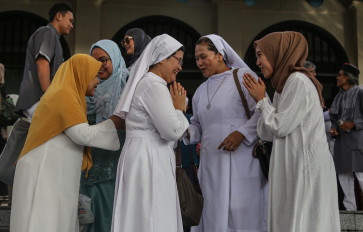Shoemaker stoking the flames of sharia state
Once Indonesia’s public enemy number one, Mochammad Achwan, 62, has devoted the remainder of his life to consistently pushing Indonesia to become an Islamic state under sharia by any means
Change text size
Gift Premium Articles
to Anyone

O
nce Indonesia’s public enemy number one, Mochammad Achwan, 62, has devoted the remainder of his life to consistently pushing Indonesia to become an Islamic state under sharia by any means.
Achwan’s decades of struggle has seemed to have now found direction, with firebrand cleric Abu Bakar Ba’asyir, the spiritual leader of terrorist group Jamaah Islamiyah (JI), appointing him leader of Jamaah Ansharut Tauhid (JAT).
JAT, founded by Ba’asyir in 2008, is an above-ground extremist organization harboring many former terrorists and violent jihadis. It currently has around 1,500 members mostly concentrated in Central and East Java.
Under his leadership, Achwan has pledged to continue fulfilling the organization’s goals already outlined by Ba’asyir through sermons and jihad.
Jihad is perceived by Achwan and JAT as the fight to uphold sharia through both peaceful and violent means.
“Violent jihad can only be committed by those who already have the necessary resources and capability to wage such holy measures,” said Achwan.
“Those who don’t have them must wait for the opportune moment with patience.”
Security analyst Al Chaidar of Syiah Kuala University in Aceh said while Achwan was not as inflammatory as Ba’asyir, JAT was unlikely to shift away from its original course under Achwan.
“There’s no indication JAT will be weaker without Ba’asyir because the organization’s measures to reach its goal will remain sermons and jihad,” said Chaidar.
“Jihad in this case will tend to toward violence,” he said, adding Achwan’s appointment was merely due to his seniority in the JAT structure, a requirement that had enabled him to be widely accepted by other senior members.
Achwan’s acquaintance with Ba’asyir, now in police custody for his alleged role in establishing a terrorist training camp in Aceh, began in 2000 during the inception of hard-line group Majelis Mujahidin Indonesia (MMI).
“Ba’asyir and I have share the similar obligation of turning Indonesia into an Islamic state, in which sharia is fully implemented,” said Achwan recently. “That’s why we get along.”
Ba’asyir had verbally touted Achwan as the next leader of the organization in May when the cleric’s health began to deteriorate.
In the first week of this month, Ba’asyir penned a letter in his prison cell officially endorsing Achwan as JAT’s new leader, responsible for the group’s day-to-day operations with full authority in exercising the course of the organization.
“Ba’asyir’s letter was read out by his son Abdul Rohim to the senior members of the organization,” said Achwan, a former JAT leader for East Java chapter.
“But I still don’t know the reasons behind why he picked me.”
For members of the extremist movement, Achwan is already a cause celebre, whose legacy includes the bombing of the Borobudur Buddhist temple complex in Magelang, Central Java, in 1985. While the attack resulted in no human casualties, part of the iconic temple was badly damaged.
In the same year, Achwan was also involved in the bombing of a church in Malang, East Java, again causing no casualties, and a failed attempt to bomb tourist-packed Kuta beach in Bali, according to a court hearing in May 1986.
The planned Kuta attack failed when the bombs detonated in Banyuwangi, East Java, en route to Bali. Four innocent passengers on the bus carrying the bombs were killed, along with the three terrorists tasked with carrying out the attack.
Achwan, then a preacher-cum-shoemaker, was accused of providing the explosive devices, and assigning his students to carry out the bombing.
The court believed Achwan was the mastermind of the attacks, and handed him a life sentence for attempting to topple the legitimate government.
Achwan’s plot was considered especially daring at a time when then president Soeharto had absolute power to commit atrocities against those linked with subversive movements.
“I was fully aware of the consequences at the time,” said Achwan.
“The aim of the bombing was to show the world the existence of jihadis vying to restore the pure Islamic teachings. We were administering a kind of shock therapy,” he said.
After spending almost 15 years in prison, including time on the notorious Nusa Kambangan maximum-security prison island off Cilacap, Central Java, Achwan was pardoned by then president B.J. Habibie in 1999, but was not released until president Abdurrahman “Gus Dur” Wahid took office in 2000.
Achwan then returned to his hometown in Malang, East Java, where he managed a leather shoe workshop from his home with his children. He sells the shoes under brand name Sifalony.
Having been actively involved in the violent jihad movement since the 1980s, Achwan said there was no reason for him to pull back, especially when the very existence of the JAT was now under his authority.
“Why would I give up the fight after all these years? It’s an obligation for all Muslims to fully apply the sharia. I’m here to make sure that happens.”









